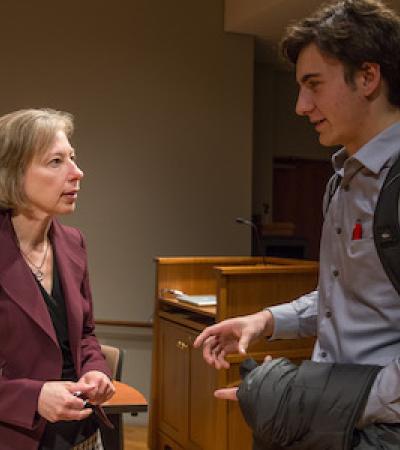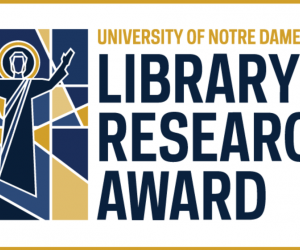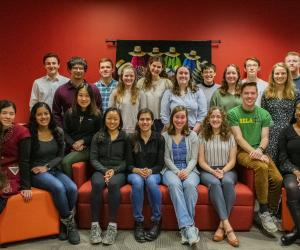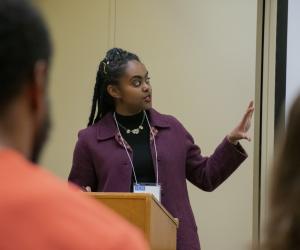This bio is current as of 2022.
Kevin Angell is a Data Scientist at Zotec Partners, a technology-enabled revenue cycle management firm helping doctors and medical practices more effectively manage clinical records and engage with insurance companies and patients. Angell focused on supporting the Patient Experience and Client Services teams through creating and managing new Anomaly Detection systems, creating machine learning models, and automating analytics. In addition to working at Zotec, Angell is an affiliate of the University of Notre Dame Fitzgerald Institute for Real Estate’s Church Property Initiative and has continued his academic research. He is preparing two articles for journal submission, “Professional Innovation? An Analysis of Legislative Professionalism and Legislative Innovation” and “Missionaries, Mechanisms, and Democracy.” Angell also serves as President of Quo Vadis, a non-profit building intentional Catholic communities in formerly underutilized church real estate. Angell graduated summa cum laude from Notre Dame in May 2020.
At Notre Dame, Angell’s research focused on three main topics, American legislative politics, religion and politics, and applied microeconomics. Angell’s senior thesis, written jointly across the Department of Political Science and the Department of Economics, empirically evaluated the impact of different factors of legislative professionalism on legislative policy innovativeness in US state legislatures. His thesis, advised by Professor Jeffrey Harden (political science and applied and computational mathematics and statistics) and Professor Ethan Lieber (economics), found strong evidence that pursuing legislative professionalization via greater staff support increases overall innovativeness while pursuing professionalization via longer legislative sessions negatively impacts overall innovation. He is currently preparing it for journal submission. Inside of religion and politics, from sophomore through senior year, Angell also assisted Professor Andrew Gould with his research on the intellectual history and evolution of religion in comparative politics. Additionally, Angell is continuing work on “Missionaries, Mechanisms, and Democracy.” Written with Professor Jeff Harden (Political Science and Applied and Computational Mathematics and Statistics), the paper, currently a users’ working paper with the Varieties of Democracy Institute, uses a causal inference approach to empirically examine the relationship between Protestant missionaries and democracy in the non-Western world. Inside of applied microeconomics, Angell worked at the Wilson Sheehan Lab for Economic Opportunities where he helped conduct impact evaluations for domestic anti-poverty programs and research the root causes of the recent opioid crisis.
Angell has presented his work at several conferences including the Northeastern Political Science Annual Conference and the de Nicola Notre Dame Center for Ethics and Culture Fall Conference. In support of his research, Angell has received funding from the Institute for Scholarship in the Liberal Arts (the Da Vinci Summer Research Grant), the Glynn Family Honors Program, and the Kellogg Institute, where he has received a conference travel grant. Beyond his participation with Kellogg, Angell was an early inductee of Phi Beta Kappa, a Sorin Fellow with the de Nicola Center for Ethics and Culture, and a Tocqueville Fellow with the Tocqueville Program. As a senior, he was awarded the Gary F. Barnabo Writing Prize from the Department of Political Science, the Lawrence J. Lewis Award for Community Service from the Department of Economics, and first place in the Hesburgh Library Research Award thesis competition.
This profile was current when he was part of the on-campus Kellogg community.
Kevin Angell’s current research focuses on two main topics, American legislative politics and religion and politics. Angell’s senior thesis, written jointly across the Department of Political Science and the Department of Economics, examines the economic and structural determinants of policy innovativeness in US state legislatures using a novel panel dataset. The thesis is advised by Professor Jeffrey Harden (political science and applied and computational mathematics and statistics) and Professor Ethan Lieber (economics). Inside of religion and politics, Angell is currently finishing preparing a coauthored journal article entitled “Missionaries, Mechanisms, and Democracy” for publication. Written with Professor Harden, the paper, currently a users’ working paper with the Varieties of Democracy Institute, uses a causal inference approach to empirically examine the relationship between Protestant missionaries and democracy in the non-Western world. Angell also assists Professor Andrew Gould with his research on the intellectual history and evolution of religion and comparative politics.
Angell has presented his work at several conferences including the Northeastern Political Science Annual Conference and the de Nicola Notre Dame Center for Ethics and Culture Fall Conference. In support of his research, Angell has received funding from the Institute for Scholarship in the Liberal Arts (the Da Vinci Summer Research Grant) the Glynn Family Honors Program, and the Kellogg Institute, where he has received a conference travel grant. Angell is also a Sorin Fellow with the de Nicola Center for Ethics and Culture and a member of the College of Arts and Letters Honesty Committee.
Thesis Title: Professional Innovation? An Analysis of the Determinants of State Policy Innovation
Thesis Advisers: Jeffrey Harden and Ethan Lieber
Research Interests
Comparative politics, religion and politics, American politics, state and local politics, election finance, applied microeconomics.
Current Research
My current research focuses are on the impact of religion on politics across the world, with a particular focus on countries in Latin America, Africa, and Asia. I also am studying the changing nature of campaign finance and electoral processes in the United States. Finally, I also am working to examine the intersection of politics and technology such as how new policies are applied to the world's rapidly changing use of technology.










